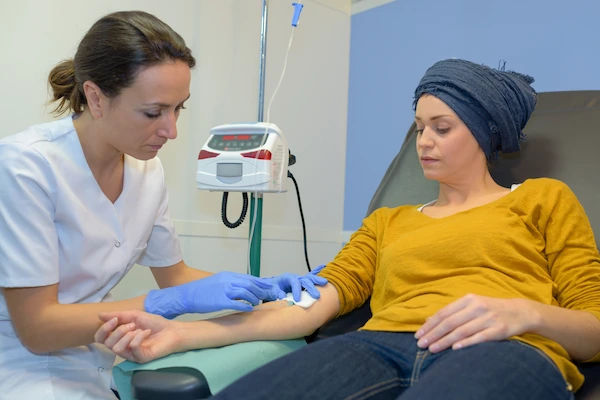Tumour Markers and Their Applications
Know about the tumour markers, what they are, common markers and their tests, procedure of test and limitations of test.

Written by Dr. Shaik Abdul Kalam
Reviewed by Dr. Dhankecha Mayank Dineshbhai MBBS
Last updated on 13th Jan, 2026

Introduction
When it comes to diagnosing and managing cancer, doctors rely on various tools and tests to make informed decisions. One such tool is tumour markers, substances that can provide important clues about cancer and how it’s progressing. If you or a loved one has been advised to get a tumour marker test, you might have questions about what they are, how they work, and why they matter.
This article will help you understand tumour markers in simple terms—what they are, how they’re used, and what you should know about them.
Consult an Oncologist for Personalised Advice
What Are Tumour Markers?
Tumour markers are substances, usually proteins, produced by cancer cells or by the body in response to cancer. These markers can be found in the blood, urine, or tissues. While they are often associated with cancer, some tumour markers can also be elevated due to non-cancerous conditions.
Doctors use tumour markers for:
- Screening – Detecting cancer early in high-risk individuals.
- Diagnosis – Helping confirm the presence of certain cancers.
- Monitoring – Tracking how well treatment is working.
- Prognosis – Predicting the likely course of the disease.
However, tumour markers alone are not enough to diagnose cancer. They are usually used alongside other tests like imaging (CT scans, MRIs) and biopsies.
Common Tumour Markers and Their Uses
Here are some widely used tumour markers and the cancers they are associated with:
1. PSA (Prostate-Specific Antigen) – Used for prostate cancer screening and monitoring.
2. CA-125 – Often checked for ovarian cancer.
3. CEA (Carcinoembryonic Antigen) – Used in colorectal, lung, and breast cancers.
4. AFP (Alpha-Fetoprotein) – Helps detect liver cancer and certain germ cell tumours.
5. CA 19-9 – Monitored in pancreatic and gastrointestinal cancers.
6. HER2/neu – Important in breast cancer treatment decisions.
How Are Tumour Marker Tests Done?
Most tumour marker tests involve a simple blood test, though some may require urine or tissue samples. The process is quick and similar to routine blood work.
When Are Tumour Markers Helpful?
- Before Treatment: To help confirm a diagnosis.
- During Treatment: To check if therapy is working.
- After Treatment: To monitor for cancer recurrence.
However, tumour markers have limitations. Some non-cancerous conditions (like infections or inflammation) can also raise their levels, and not all cancers produce detectable markers.
Limitations of Tumour Markers
While useful, tumour markers are not foolproof. Some key limitations include:
- False Positives: Elevated levels without cancer.
- False Negatives: Normal levels despite cancer presence.
- Not Specific: Some markers are linked to multiple cancers.
This is why doctors use them alongside other diagnostic methods.
What Should You Do If Your Tumour Marker Levels Are High?
If your test shows elevated tumour markers, don’t panic. It doesn’t always mean cancer. Your doctor will likely order further tests (like imaging or a biopsy) to confirm the cause.
Tips for Managing Your Health
Tips for managing health include:
- Follow Up: Attend all recommended tests and consultations.
- Healthy Lifestyle: A balanced diet, regular exercise, and avoiding smoking can improve overall health.
- Stay Informed: Ask your doctor questions to understand your results better.
Final Thoughts
Tumour markers are valuable tools in cancer care, but they are just one piece of the puzzle. Understanding their role can help you make informed decisions about your health. If you have concerns about cancer risk or test results, don’t hesitate to seek medical advice.
Consult an Oncologist for Personalised Advice
Consult an Oncologist for Personalised Advice

Dr.sanchayan Mandal
Medical Oncologist
17 Years • MBBS, DrNB( MEDICAL ONCOLOGY), DNB (RADIOTHERAPY),ECMO. PDCR. ASCO
Kolkata
Dr. Sanchayan Mandal Oncology Clinic, Kolkata

Dr Gowshikk Rajkumar
Oncologist
10 Years • MBBS, DMRT, DNB in Radiation oncology
Bengaluru
Apollo Clinic, JP nagar, Bengaluru

Dr. Raja T
Oncologist
20 Years • MBBS; MD; DM
Chennai
Apollo Hospitals Greams Road, Chennai
(225+ Patients)

Dr. Sanchayan Mandal
Medical Oncologist
17 Years • MBBS, DrNB( MEDICAL ONCOLOGY), DNB (RADIOTHERAPY),ECMO. PDCR. ASCO
Kolkata
MCR SUPER SPECIALITY POLY CLINIC & PATHOLOGY, Kolkata

Dr. Prashant Chandra Das
Surgical Oncologist
15 Years • MBBS (MKCG Medical college) MCh (Surgical Oncology, Kidwai memorial institute of Oncology, Bangalore) MS (General Surgery, BHU Varanasi) Fellowship in Minimal Access Surgery ( FMAS). ESSO Course On Minimally Invasive Esophagectomy & Gastrectomy (UMC, Utrecht, Netherlands). Trained in Robotic and Laparoscopic Cancer Surgery.
Bhubaneswar
Apollo Hospitals Old Sainik School Road, Bhubaneswar
(25+ Patients)
Consult an Oncologist for Personalised Advice

Dr.sanchayan Mandal
Medical Oncologist
17 Years • MBBS, DrNB( MEDICAL ONCOLOGY), DNB (RADIOTHERAPY),ECMO. PDCR. ASCO
Kolkata
Dr. Sanchayan Mandal Oncology Clinic, Kolkata

Dr Gowshikk Rajkumar
Oncologist
10 Years • MBBS, DMRT, DNB in Radiation oncology
Bengaluru
Apollo Clinic, JP nagar, Bengaluru

Dr. Raja T
Oncologist
20 Years • MBBS; MD; DM
Chennai
Apollo Hospitals Greams Road, Chennai
(225+ Patients)

Dr. Sanchayan Mandal
Medical Oncologist
17 Years • MBBS, DrNB( MEDICAL ONCOLOGY), DNB (RADIOTHERAPY),ECMO. PDCR. ASCO
Kolkata
MCR SUPER SPECIALITY POLY CLINIC & PATHOLOGY, Kolkata

Dr. Prashant Chandra Das
Surgical Oncologist
15 Years • MBBS (MKCG Medical college) MCh (Surgical Oncology, Kidwai memorial institute of Oncology, Bangalore) MS (General Surgery, BHU Varanasi) Fellowship in Minimal Access Surgery ( FMAS). ESSO Course On Minimally Invasive Esophagectomy & Gastrectomy (UMC, Utrecht, Netherlands). Trained in Robotic and Laparoscopic Cancer Surgery.
Bhubaneswar
Apollo Hospitals Old Sainik School Road, Bhubaneswar
(25+ Patients)



